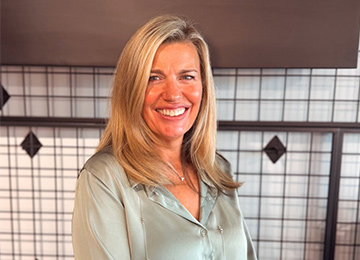
Developments in mental health underwriting
Undertaking a degree in psychology compelled Anne Evason to volunteer for the Samaritans – and makes her well placed to improve how Zurich underwrites mental health issues.
While working full-time as an underwriter, Anne Evason undertook a psychology degree with the Open University.
With her three children grown up, she had more time on her hands. Concurrently, her father’s behaviour had changed, initially attributed to a series of transient ischaemic attacks, or ‘mini strokes’, and later to dementia.
I wanted to understand what was going on in my dad’s mind – that’s really what prompted me to do the degree

Having graduated in 2016, she sought to put her new-found knowledge to good use and volunteered for the Samaritans. She became increasingly involved with the charity, first as a listener, then a shift leader, trainer and latterly a deputy director.
“As a listener you work in pairs,” explains Anne. “You both do your listening but if you realise your shift partner is on a difficult call, you’d also be there to support them.
“Not everybody at the end of the line is in crisis and in the process of taking their life but you do take calls from people who are at that point. It is very distressing but you have to be there for that person, to listen and support.
“That’s why it’s important that Samaritans are there to support each other – so that you can be there for the next caller. At the end of each shift you download to your shift leader. At the Samaritans it’s just as important to support each other as well as the callers.”
All walks of life
Being based in Bury, Greater Manchester, some of those Anne supported had been affected by the 2017 Manchester Arena terror attack. Others suffered from severe mental health issues due to prolonged periods of difficult life situations or one-off triggers.
“Some people are predisposed to mental health issues because of what they have experienced in their lives but others never expected to be in a position where they are in crisis. An event can happen and mental health can spiral.
“People from all walks of life reach out to the Samaritans for support. After my dad passed away, I wanted to give something back but it’s never truly altruistic. If talking to someone can make a difference, that is immensely rewarding.”
Anne gained a huge amount of insight from being a Samaritan’s listener. “Being a Samaritan opened my eyes to other people’s struggles. It made me realise how lucky I am,” she says.
It also made her think about the pressures of modern life and the degree to which we are all affected.
“Like everyone, I’ve been through ups and downs. Life throws lots of different things at us. You can’t really go through life without experiencing some sort of stress or distress,” she says.
“It doesn’t necessarily result in a diagnosis but people have to cope with things throughout their lives.”
Tell us your story
Anne stepped back from the Samaritans in 2020 after her mother passed away. When she joined Zurich in May 2022 as a senior life development underwriter, one of her first jobs was to look at our mental health rules.
“We want to deal with people in a human way,” says Anne, who has worked in insurance since 1989 and been an underwriter since 2001.
“We should be accepting people with mild to moderate mental health problems – things like depression and anxiety – at the point of sale.
“It is about recognising that lots of people have situations in their lives that are distressing and that they have to cope with; that is part of everyday living. Modern life is quite stressful.”
One of the changes Anne made was to extend rules surrounding time off work. “It can take time for people to get their lives back on track, especially following a bereavement,” she says.
“Mental health is individual to each person. We all cope in our own ways. Our own life experiences help us to deal – or not deal – with the things that happen in life.”
For applications that are referred to an underwriter, Zurich has a text box to allow the circumstances surrounding mental illness to be conveyed.
“The difficulty is where to position your parameters before an application is referred to an underwriter,” says Anne, “but we have a free text box for people to tell us their story. We don’t want to be intrusive but we want to be able to understand what has happened.
“It may be that someone still have symptoms but if they are back at work and coping why shouldn’t they get insurance?”
Be that listener
In certain cases, Anne encourages Zurich’s team of underwriters to pick up the phone and have a conversation.
“It can be difficult for people. I’ve had the training. I know it’s okay to talk about suicide and explore what is going on in someone’s life,” she says.
She also urges advisers to “be that listener” – to have an open dialogue with clients about prior or existing mental health conditions and understand their stories. That way, they can help to convey them to insurers.
“The more we can understand, the easier it is to the make a decision without the need to write to the doctor,” she says.
Anyone with a history of suicide or self-harm is automatically referred for to an underwriter with a free text question so that Zurich can get some context.
“We might look at it and it makes complete sense,” adds Anne. “Someone may have made an attempt years ago but are fine now, so it shouldn’t affect their prospects of getting life insurance today.”
Sign up to our advice matters newsletter
Featured articles



